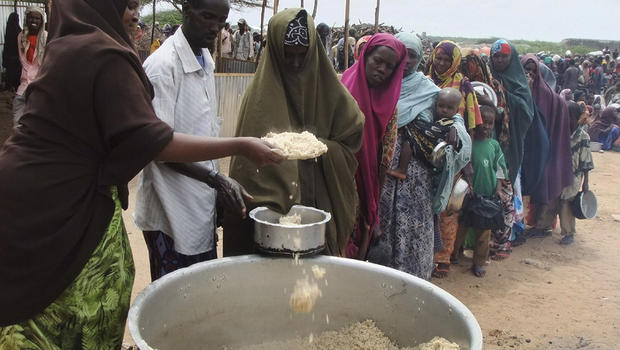
June 8, 2017 | Tufail Hussain | Islamic Relief UK – I recently returned from spending a week in Somalia, where I saw first-hand the catastrophic effects that today’s famine is having on its people, and how drought has devastated the land they depend on.
Agriculture is the country’s largest employer, with two-thirds of Somalia’s workforce traditionally relying on farming to scratch a living. But no longer, however, for years of drought have reduced fields to parched scrubland that cannot be farmed or used to sustain livestock, leading to the deaths of many thousands of cattle, sheep and goats. As a result, some 6.5 million people – half the population of Somalia – have had to leave their barren farmlands in search of food and water.
The number of people affected by the combination of drought and famine is unprecedented, with women, children and older people suffering the most – more than 800,000 children under the age of five are severely malnourished.
Since March, Islamic Relief has worked to highlight the urgent need for funds to help the 16 million people in Ethiopia, Kenya, Somalia and South Sudan who are on the brink of starvation and in immediate need of food, water and medical treatment. Firstly, in collaboration with the Disasters Emergency Committee (DEC), through our joint East Africa Crisis Appeal, and then later through our own independent campaign.
Thankfully, the response from the British public has been phenomenal, with the DEC crisis appeal raising an incredible £50 million to enable its member charities to step up their response and provide more food, water and medical care to these millions of people. Most are women and children who walk 30km in excruciating heat in search of some food and water.
During the 2011 famine, 260,000 people died in Somalia. History looks set to repeat itself unless we act now to prevent a similar situation from happening again.
I visited three camps in Somalia for people who have been internally displaced. At one of the camps I met two dear people who shared their stories with me – stories that I believe captures the pain and grief that millions of people are experiencing there on a daily basis.
Fatouma, from the town of Burhakaba in the south western Bay region, around 250km from Mogadishu, told me:
“We are farmers and our lives depend on our livestock and farming. With no rain there was no food for our cattle to eat and 30 of our cattle very quickly died. We weren’t able to grow anything, and we were forced to leave home in search of food and water.”
With her husband and their six malnourished children, the family left their village with only the clothes on their backs. Their journey on foot was an arduous one. “Walking in this heat was almost unbearable, but we had no choice,” she said. “My children were sick because we couldn’t feed them. The bodies of my three youngest started to badly swell.”
Unknown to Fatouma, the swelling was an indicator of kwashiorkor, a serious form of malnutrition due to a diet lacking in protein and other essential nutrients. Too much fluid in the body’s tissues causes swelling under the skin and results in an enlarged “pot-belly” stomach, leaving children very vulnerable to infections.
Sadly, one by one, her three youngest children Nooratu, Khadiju and Usman, died on the journey to Mogadishu. Fatouma and her husband could not afford to bury their children but local villagers en route raised the money for the three funerals.
It took the rest of the family 10 days to reach Mogadishu. They arrived at a camp with little sanitation, where the only food is that which is donated by local people, who are themselves struggling to get by. Camps like these are filling up fast. Over two days the numbers had swelled by over 200.
We did not speak the same language, but from looking into Fatouma’s eyes it was clear that she was still in a deep state of shock, her pain palpable from her body language.
Then there is Mohammad Ali Abdullah, who lost his wife to acute watery diarrhoea. When you are thirsty, and there is no clean water but puddles of mud, you become so desperate that you drink that. She contracted diarrhoea and, as a result, passed away.
I met Mohammad and his five children when they had just arrived at the camp, desperately looking for shelter from the sun and the intense heat. They were a sad sight, having lost their mother on top of walking for days without food or water.
This is a crisis upon a crisis. It is the reality for millions of people in Somalia and now across much of East Africa. Unless we continue to act by donating to Islamic Relief’s East Africa Crisis Appeal or any of the aid agencies already working on the ground, we could be facing another catastrophic humanitarian disaster in the region that will overshadow the 2011 famine.
.
.
.
___________________________________
_____________________________________________________________________________________
Xafiiska Wararka Qaranimo Online | Mogadishu, Somalia
_____________________________________________________________________________________Advertisement
_____________________________________________________________________________________





